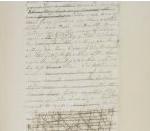Breaking news from Oxford University: It turns out that Jane Austen did not deserve her reputation as a perfect writer, never-crossed-out-a-word writer. Those elegant sentences were often smoothed out by an editor who cleaned up her novels for publication.
She wasn’t even a very good speller, and – most startling of all – she was messy. Here, for example, is a much-scratched-out page from her novel Persuasion:
(You can read or listen to an NPR feature about the manuscripts by clicking here.)
The release of Austen’s manuscripts by Oxford University this week brought with it a storm of controversy. Some Austen lovers are bemoaning the edits, complaining that Austen’s experimental style and feminine voice were lost when the changes were made. Others say that literary critics and historians need to reappraise Austen’s reputation.
And some people (I’m one) are shrugging our shoulders and saying that we knew it all along.
Well, not really.
But it’s generally true that when you encounter a great writer, there’s a great editor nearby. Or at least lots and lots of revising. For years I’ve been saying the first thing any would-be writer needs is a substantial wastebasket.
When I teach my own writing classes, I always bring in a letter I received from an editor about a book review I submitted for publication. Before my book review was accepted, I had to make 18 (count ’em) changes.
My students are always shocked. Some are outraged. Their writing teacher produced a manuscript that – gasp – wasn’t perfect?
That’s right. All professional writers make revisions. Lots of them.
Let’s turn the tables a bit. Why was Jane Austen (as I still think) such a great writer?
She had two things going for her: A huge wastebasket and a terrific editor.
Let’s make that three things. Most important of all was her willingness to stick with it until she got it right. Good for her – and good for us, who are much richer for the literary legacy she left behind.
(To learn more about what Jane Austen did right, click here.)





